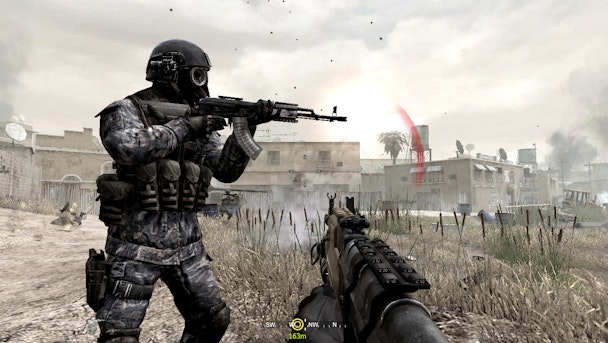ITV and Sky escape ASA action for scheduling ‘distressing’ Call of Duty ads
Both ITV and Sky have escaped action from the Advertising Standard Authority (ASA). The ad watchdog was handling complaints questioning whether a set of ads for Call of Duty were inappropriately scheduled.

ITV and Sky swerve ASA rebuke for scheduling ‘distressing’ Call of Duty ads
Both sets of ads for the PEGI 18 video game Call of Duty 4: Modern Warfare remake were served up during Rugby World Cup matches on ITV and Premier League games on Sky in October last year.
A number of complainants found issue with the TV trailer for the video game - a photorealistic portrayal of urban warfare, including gunfire, bomb blasts and resulting infernos, a helicopter crashing, among scenes depicting military vehicles and personnel discharging ammunition. It also featured a PEGI 18 logo.
Due to the nature of the content, which was aired during prime sporting events on Sky and ITV, a number of people got in touch with the ad watchdog complaining that they were inappropriately scheduled after their children became distressed by the content.
The ASA received 24 complaints about the ads that showed on ITV during the Rugby World Cup, while it received two complaints about Sky’s showing of the trailer during Premier League Games. The complainants believed the content in the ads were not suitable for children and was irresponsible.
For both cases, Clearcast defended the showing, stating that the ad was cleared with a scheduling restriction, which ensured it was scheduled away from programming commissioned for and principally directed at children under 16 years of age.
It considered that the interpersonal violence was mild and shots that featured firearms and explosions were shot in duration and lacked distress.
Beyond this, it argued that the ads did not show the consequences of any violence, as dead bodies or bloody injuries were omitted. Therefore, it felt this was in line with other ads for games with mild, computer-generated action and was not deserving for a higher timing restriction which would not have been suitable.
In the case of ITV, it provided Broadcasters Audience Research Board (BARB) data that showed the percentage of younger children who viewed Rugby World Cup games on the broadcasters’ channels was 2.89%.
Activision Blizzard, which owns the Call of Duty franchise, argued that the ads were not scheduled during content principally directed at or likely to appeal particularly to children, and that Sky and ITV had compiled with the relevant Clearcast restrictions, so the ads were appropriately scheduled.
ITV defended its decision to air the ads, saying it had exercised responsible judgement on the scheduling of the ads – both based on the audience profile and on specific audience index data – which they felt adhered to the relevant restrictions.
Similarly, Sky said it had agreed with the scheduling restrictions imposed by Clearcast. Further, the broadcaster provided evidence that showed the index scores for the relevant matches and stated that it felt an upheld ruling would be disproportionate as it would prevent broadcasters scheduling ads for action films or videogames in sports coverage that attracted a majority adult audience.
Considering all the responses, the ASA decided to neither reprimand ITV or Sky for the showing of the ads. While it noted that the violent scenes in the ads were fleeting and did not glamorise the violence depicted, it deemed the content unsuitable for younger children.
Consequently, it considered the ex-kids scheduling restriction applied by Clearcast was appropriate, and that the ad should not have been scheduled in or around programmes which were likely to be of particular appeal to children, as required by the BCAP Code.
In terms of ITV, it considered the BARB data for the Rugby World Cup series that younger children only made up 2.89% of the audience. The ASA said that while the ads had been broadcast at various times between 08:55 and 13:20 – times where children were likely to be at home and watching television - the data showed that children made up only a small proportion of the programme’s audience, and it did not consider the programme itself was likely to be of particular appeal to children.
Regarding the ads shown on Sky, it felt that Premier League Football matches were neither commissioned for, nor principally directed at children.
After assessing the BARB data for the matches, similarly to the Rugby World Cup, the data showed that children made up only a small proportion of the programme’s audience, and it did not consider the programme itself was likely to be of particular appeal to children.
For this reason, the ad watchdog concluded that neither sets of ads on ITV and Sky had been inappropriately scheduled.

